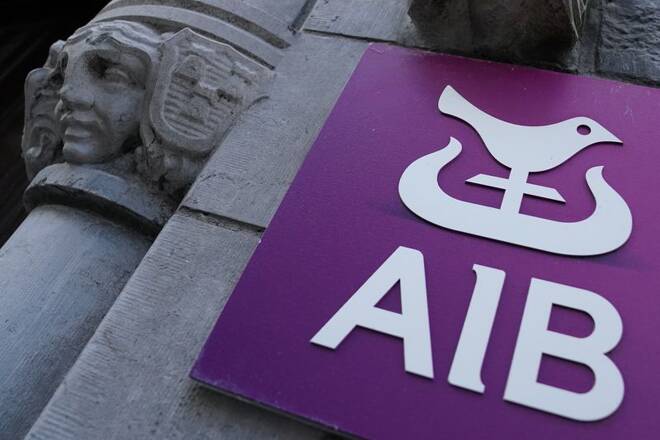Advertisement
Advertisement
Ireland’s AIB expects 10% rise in net interest income in 2022
By:
By Padraic Halpin DUBLIN (Reuters) -AIB Group expects net interest income to jump by 10% this year as a result of more aggressive European Central Bank (ECB) and Bank of England (BOE) rate hikes, prompting Ireland's largest mortgage lender to review its medium-term targets.
By Padraic Halpin
DUBLIN (Reuters) -AIB Group expects net interest income to jump by 10% this year as a result of more aggressive European Central Bank (ECB) and Bank of England (BOE) rate hikes, prompting Ireland’s largest mortgage lender to review its medium-term targets.
Net interest income rose by 2% year on year in the first six months of 2022, the bank said on Friday, helping it almost double its half-year profit after tax to 477 million euros. It also benefited from a 309 million euro impairment writeback.
Previous guidance of a high single-digit percentage increase in full year net interest income was dropped after it raised its rate assumptions for an ECB deposit rate of 1% and a BOE rate of 2.75% by December 2022.
AIB shares were 1.9% higher at 2.19 euros by 0740 GMT.
Chief Financial Officer Donal Gavin told Reuters that while the significant momentum the bank is seeing in income will be offset to some extent by cost inflation, it expects income to “strongly outperform” any impact on costs.
On the medium term targets currently under review, AIB specified that it saw upside potential to its goal to deliver sustainable return on tangible equity (ROTE) above 9% by 2023.
AIB had a fully loaded core tier 1 capital ratio (CET1 ratio) – a key measure of financial strength – of 15.3% at the end of June and Gavin said the bank would look at how to distribute any surplus capital in 2023.
He also said the bank was not seeing any significant slowdown in demand for credit from Irish businesses, although he noted that firms have been conservative in recent years due to the twin threats of Brexit and COVID-19.
“There can be no doubt that higher inflationary costs are going to have an impact on businesses in the future but to date, we really aren’t see any impact in any particular sectors,” Gavin told Reuters in a telephone interview.
“I really do think that whatever difficulties we face in 2023 and 2024, they’re going to be externally driven, everything that we’re seeing on the ground from an Irish perspective remains pretty solid and pretty strong.”
(Reporting by Padraic Halpin; editing by Jason Neely and David Evans)
About the Author
Reuterscontributor
Reuters, the news and media division of Thomson Reuters, is the world’s largest international multimedia news provider reaching more than one billion people every day. Reuters provides trusted business, financial, national, and international news to professionals via Thomson Reuters desktops, the world's media organizations, and directly to consumers at Reuters.com and via Reuters TV. Learn more about Thomson Reuters products:
Advertisement
